12 start with S start with S
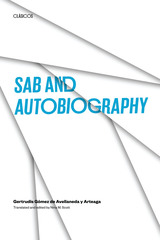
Eleven years before Uncle Tom's Cabin fanned the fires of abolition in North America, an aristocratic Cuban woman told an impassioned story of the fatal love of a mulatto slave for his white owner's daughter. So controversial was Sab's theme of miscegenation and its parallel between the powerlessness and enslavement of blacks and the economic and matrimonial subservience of women that the book was not published in Cuba until 1914, seventy-three years after its original 1841 publication in Spain.
Also included in the volume is Avellaneda's Autobiography (1839), whose portrait of an intelligent, flamboyant woman struggling against the restrictions of her era amplifies the novel's exploration of the patriarchal oppression of minorities and women.
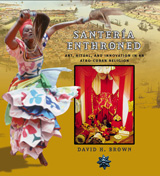
Focusing on the royal throne as a potent metaphor in Santería belief and practice, Brown shows how negotiation among ideologically competing interests have shaped the religion's symbols, rituals, and institutions from the nineteenth century to the present. Rich case studies of change in Cuba and the United States, including a New Jersey temple and South Carolina's Oyotunji Village, reveal patterns of innovation similar to those found among rival Yoruba kingdoms in Nigeria. Throughout, Brown argues for a theoretical perspective on culture as a field of potential strategies and "usable pasts" that actors draw upon to craft new forms and identities—a perspective that will be invaluable to all students of the African Diaspora.
American Acemy of Religion Award for Excellence in the Study of Religion (Analytical-Descriptive Category)
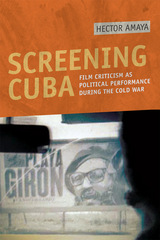

Coyle and Filreis present the entire extant correspondence between the two men. The fifty-one Rodriguez Feo letters and ten of the numerous Stevens letters are printed here for the first time, and the exchange between the two is unusually complete. The work includes a critical introduction and complete annotation of the letters.
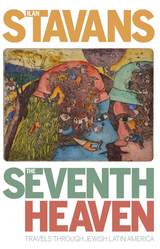
Internationally renowned essayist and cultural commentator Ilan Stavans spent five years traveling from across a dozen countries in Latin America, in search of what defines the Jewish communities in the region, whose roots date back to Christopher Columbus’s arrival. In the tradition of V.S. Naipaul’s explorations of India, the Caribbean, and the Arab World, he came back with an extraordinarily vivid travelogue. Stavans talks to families of the desaparecidos in Buenos Aires, to “Indian Jews,” and to people affiliated with neo-Nazi groups in Patagonia. He also visits Spain to understand the long-term effects of the Inquisition, the American Southwest habitat of “secret Jews,” and Israel, where immigrants from Latin America have reshaped the Jewish state. Along the way, he looks for the proverbial “seventh heaven,” which, according to the Talmud, out of proximity with the divine, the meaning of life in general, and Jewish life in particular, becomes clearer. The Seventh Heaven is a masterful work in Stavans’s ongoing quest to find a convergence between the personal and the historical.
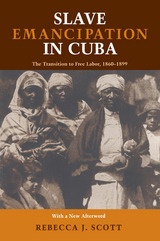
Slave Emancipation in Cuba is the classic study of the end of slavery in Cuba. Rebecca J. Scott explores the dynamics of Cuban emancipation, arguing that slavery was not simply abolished by the metropolitan power of Spain or abandoned because of economic contradictions. Rather, slave emancipation was a prolonged, gradual and conflictive process unfolding through a series of social, legal, and economic transformations.
Scott demonstrates that slaves themselves helped to accelerate the elimination of slavery. Through flight, participation in nationalist insurgency, legal action, and self-purchase, slaves were able to force the issue, helping to dismantle slavery piece by piece. With emancipation, former slaves faced transformed, but still very limited, economic options. By the end of the nineteenth-century, some chose to join a new and ultimately successful rebellion against Spanish power.
In a new afterword, prepared for this edition, the author reflects on the complexities of postemancipation society, and on recent developments in historical methodology that make it possible to address these questions in new ways.

Knight examines the conditions that maintained slavery in Cuba in the nineteenth century and perceptively analyzes the sociological effect of the institution on the island's politics, culture, and economy. He attacks the long-held theory that an Iberian cultural heritage and the Roman Catholic Church significantly modified the institution of slavery and shows that Cuban slave society shared many characteristics with other Caribbean societies, whether Anglo-Saxon, French, or Spanish. Knight's systematic study includes important new material from the archives of the Ministerio del Ultramar in Madrid.

Cuba has long been a social policy pioneer in Latin America. Since the 1959 revolution, its government has developed ambitious social policies to address health care, higher education, employment, the environment, and broad social inequalities, among other priorities. Cuban strategies emphasized universal rights and benefits, provided free of financial cost to users, and implemented under centralized and unitary policy design.
Following the Soviet Union’s collapse in 1991, funds for these policies came under strain, although systematic efforts have been made to sustain them. Poverty rates and inequality have risen. Access to higher education has become more difficult. Access to health care has become less reliable. Environmental policies are both more salient and more difficult to sustain. The government has resisted privatization policies, but has sought to decentralize the implementation of various policies, fostering non-state cooperatives as well. At the same time, many Latin American governments have experimented with new social policies that, in this century, reduced poverty rates significantly and in some countries somewhat reduced various inequalities.
Still facing severe economic challenges, Cuba may look to learn from the policies of its Latin American neighbors, in some instances for the first time ever. This book analyzes these issues comparatively and in depth.
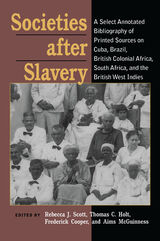
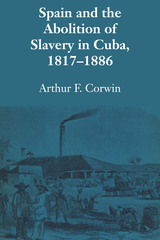
This book explores the abolition of African slavery in Spanish Cuba from 1817 to 1886—from the first Anglo-Spanish agreement to abolish the slave trade until the removal from Cuba of the last vestige of black servitude. Making extensive use of heretofore untapped research sources from the Spanish archives, the author has developed new perspectives on nineteenth-century Spanish policy in Cuba. He skillfully interrelates the problem of slavery with international politics, with Cuban conservative and liberal movements, and with political and economic developments in Spain itself.
Arthur Corwin finds that the study of this problem falls naturally into two phases, the first of which, 1817–1860, traces the gradual reduction of the African traffic to the Spanish Antilles and constitutes, in effect, a study in Anglo-Spanish diplomacy. He gives special attention here to the aggressive nature of British abolitionist diplomacy and the mounting but generally ineffective indignation resulting from Spanish failure to apply sanctions against the traffic, as well as the increasing North American interest in the annexation of Cuba. The first phase has for its principal theme the manner in which for decades Spain feigned compliance with agreements to end the slave trade while actually protecting slaveholding interests as the best means of holding Cuba.
The American Civil War, which destroyed the greatest bulwark of black slavery in the New World, marked the opening of a new phase, 1860–1886. The author strongly emphasizes here such influences as the rise of the Creole reform movement in Cuba and Puerto Rico, which, reading the signs of the times, gave the initial impulse to a Spanish abolitionist movement and contributed to closing the Cuban slave trade in 1866; the liberal revolution of 1868 in Spain and its promise of colonial reforms; the outbreak of the great Creole rebellion in Cuba, 1868–1878, and the abolitionist promises of the rebel chieftains; the threat of American intervention and the abolitionist pressure of American diplomacy; and the protests of the Spanish reactionaries in Spain and Cuba, leading to further procrastination in Madrid. The second phase has as its principal theme the shaping, through all these intertwined factors, of Spain’s first measure of gradual emancipation, the Moret Law of 1870, and all subsequent steps toward abolition.

In spite of the obvious success and political importance of sport in Cuba, very little has been written on the subject. Sport in Cuba closes this gap. In the first major study on the Cuban system of sports and physical culture, Paula J. Pettvino and Geralyn Pye analyze how sports was given such a high priority in Cuba, how the country became a world power by the mid-1970s, and the impact of sports on Cuban society. Moving from the early days when the government's approach to sports was loosely defined, through the construction of a complex system of physical culture, to the current years of uncertainty, Sport in Cuba utilizes both archival sources and personal interviews. It will be of interest to Latin Americanists and students of sports.
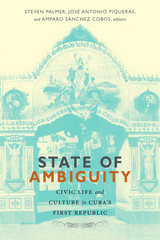
Contributors. Imilcy Balboa Navarro, Alejandra Bronfman, Maikel Fariñas Borrego, Reinaldo Funes Monzote, Marial Iglesias Utset, Steven Palmer, José Antonio Piqueras Arenas, Ricardo Quiza Moreno, Amparo Sánchez Cobos, Rebecca J. Scott, Robert Whitney
READERS
Browse our collection.
PUBLISHERS
See BiblioVault's publisher services.
STUDENT SERVICES
Files for college accessibility offices.
UChicago Accessibility Resources
home | accessibility | search | about | contact us
BiblioVault ® 2001 - 2024
The University of Chicago Press









